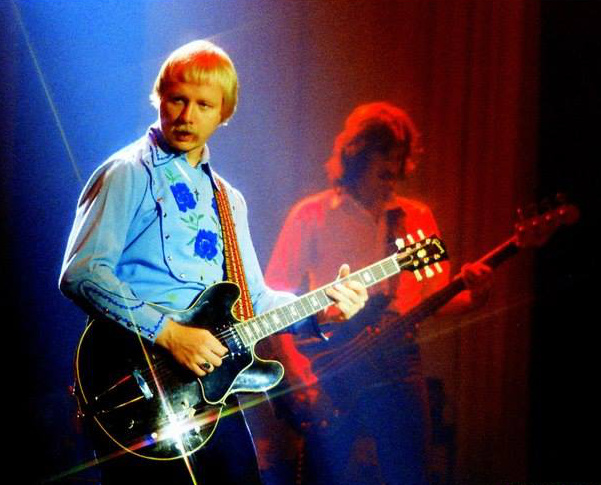Kerry Livgren
Birth name Kerry Allen Livgren
Born September 18, 1949
Topeka, Kansas, United States
Origin Topeka, Kansas
Genres Progressive rock, rock, hard rock, folk rock
Occupation(s) Composer; Recording Artist
Instruments Guitar, keyboards
Kerry Allen Livgren (born September 18, 1949) is an American musician and songwriter, best known as one of the founding members and primary songwriters for the 1970s progressive rock band Kansas.
Livgren was raised in Topeka, Kansas by his father, Allen Leroy, an industrial engineer, and his mother, Betty (nee McElhiney). He was drawn to music at a young age, his first musical interests developed with classical and jazz influences. His musical odyssey started with an electric guitar he built using a cheap Stella guitar, a Sears amplifier and a low-quality Astatic microphone. Along with learning guitar, Livgren also focused on learning to write songs due to his desire for more creative expression and originality. He attended Washburn University for some time.
Livgren was a member of numerous bands in the late 1960s and early 1970s and quickly developed a reputation for complex compositions and poetic lyrics that explored spiritual themes. His investigations into various religions are reflected in the lyrics of his songs on Kansas’ first six albums.
Livgren formed his first band, the Gimlets, with several close friends in high school including John Pribble, drums, Scott Kessler, bass, Tim Strauss, guitar, and Dan Wright on keyboards. They soon found themselves booked after school and on weekends throughout Kansas and neighboring Missouri.
Livgren continued to perform with the Gimlets through college before joining a predominantly black mainstream rhythm and blues band named the Mellotones, in which he met keyboard player Don Montre in 1969.
Forming a deep friendship, Livgren and Montre decided to leave the Mellotones and join the more commercially viable band The Reasons Why, which included Lynn Meredith and Wright.
In 1970, Livgren and Ehart decided to form a new group by combining the best members from Saratoga and Phil’s band White Clover (which included Steve Walsh, Rich Williams, Hope and Jeff Glixman). While Livgren and Ehart were discussing what to call the new band, Hope walked in on the conversation and suggested they call themselves Kansas. This version of Kansas (referred to as “Kansas I” by fans) was known for its complex musical arrangements and originality, but this lineup lasted for only one year.
Shortly afterward, Livgren was invited by Ehart to join the reformed White Clover, which also included vocalist Walsh, violinist Robby Steinhardt, bassist Hope, guitarist Williams and Ehart on drums. Prior to Livgren’s joining the band, White Clover had sent out a five-song demo tape, which Don Kirshner was interested in for his new label. As part of the effort to sign with Kirshner, the players soon renamed themselves Kansas, becoming the third, and eventually the best-known, lineup to use this name.
In early 1979, Livgren became interested in The Urantia Book, a series of papers that claim to be a revelation authored by supernatural beings. Its influence can be felt in the lyrics of Kansas’ 1979 album Monolith. Livgren subsequently rejected Urantia doctrine, and while on tour with the band in support of Monolith, he converted to Christianity.
On September 1, 2009, Livgren had a stroke early in the day. His condition was reported as “serious, but stable.” By September 4, family members called his condition positive and said his progress in recovering was encouraging.[10] Livgren underwent surgery and received two stents in his carotid arteries. The area of his brain in which the stroke-causing clot formed deals with language and other high-end skills. Livgren’s family says his face did not have the “sagging” often found in stroke victims, he recognized family members, and would squeeze their hands in recognition. The family established the Kansas band Web site as the only authorized source for information on Livgren’s recovery. Livgren has now recovered partially and has resumed work on his various musical projects.
He made his first post-stroke appearance with Kansas on January 28, 2011, when he conducted the Kansas State University Symphony Orchestra for “Dust in the Wind” during a special concert celebrating the 150th anniversary of the state of Kansas. Livgren was greeted with a prolonged standing ovation.
Discography
With Kansas
1974 Kansas
1975 Song for America
1975 Masque
1976 Leftoverture
1977 Point of Know Return
1978 Two for the Show live
1979 Monolith
1980 Audio-Visions
1982 Vinyl Confessions
1983 Drastic Measures
1992 Live at the Whisky live (guest appearance only)
2000 Somewhere to Elsewhere
2009 There’s Know Place Like Home live (guest appearance only)
Compilations
1984 The Best of Kansas
1992 Carry On
1994 The Kansas Boxed Set
1999 The Best of Kansas
2002 The Ultimate Kansas
2004 Sail On: The 30th Anniversary Collection (2CD/1DVD)
2005 On the Other Side re-release of Carry On
Solo, AD, Proto-Kaw
1980 Seeds of Change
1984 Time Line (Kerry Livgren/AD)
1985 Art of the State (AD)
1986 Reconstructions (AD)
1988 Prime Mover (Kerry Livgren/AD)
1989 One of Several Possible Musiks
1995 When Things Get Electric (Kerry Livgren and Corps de Pneuma) (remastered in 2005)
1997 Odyssey into the Mind’s Eye soundtrack (remastered in 2005)
2000 Collector’s Sedition (Review)
2002 Early Recordings from Kansas 1971–1973 (Proto-Kaw)
2004 Before Became After (Proto-Kaw)
2006 The Wait of Glory (Proto-Kaw)
2011 Forth (Proto-Kaw)
Live and compilations
1998 AD Live (AD) (Review)
1988 Compact Favorites (AD)
1992 Decade
2002 Best of Kerry Livgren
From Wikipedia, the free encyclopedia

